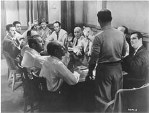Imagining the Reasonable Jury
 As has already been noted here, Dan Kahan dropped by the law school earlier this week and gave three fascinating presentations to the law school community. One, which Michael commented on earlier, was on his paper (co-authored with David Hoffman and Donald Braman) criticizing the Supreme Court’s decision in Scott v. Harris, entitled “Whose Eyes are You Going to Believe? Scott v. Harris and the Perils of Cognitive Illiberalism.”
As has already been noted here, Dan Kahan dropped by the law school earlier this week and gave three fascinating presentations to the law school community. One, which Michael commented on earlier, was on his paper (co-authored with David Hoffman and Donald Braman) criticizing the Supreme Court’s decision in Scott v. Harris, entitled “Whose Eyes are You Going to Believe? Scott v. Harris and the Perils of Cognitive Illiberalism.”
In brief, Kahan and his co-authors argue that the Supreme Court went awry in Scott by refusing to credit the views of “an identifiable subcommunity” as being within the realm of those held by “reasonable jurors.” This refusal to credit such beliefs with reasonableness, they argue, is potentially destructive of the legitimacy of the justice system.
It’s a fascinating argument, backed by a novel empirical approach to assessing the views of “reasonable jurors” in a use of force case like Scott. But I’m left with a question about the theory, and a question about Scott: Today, I want to focus on the theory: How are judges to tell when the views of “an identifiable subcommunity” are at issue, making summary judgement less appropriate? Monday, I’ll focus on Scott: I’m not certain that the Scott holding is as Kahan et al. describe it, which way may mute their concern.

